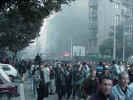|

of the Belgrade Coup
Editor & Webmaster
Leon Chame - 2008
Yugoslav Associates:
- Zoran Radojicic
- Dejan Vukelic
- George Orwell
Contributing Websites:
- Original Sorces
- Transnational (TFF)
- Fair sources
- WSWS
avgust 20, 2008
| |
Co-sign the complaint filed by Mr.
Alexander Lykourezos against NATO's political and military leadership dated May 3, 1999,
before the International Criminal Tribunal for the Former Yugoslavia at the Hague, www.nato-warcrimes.gr

Is U.S. committing war crimes from on high?
By Bill Ramsey, Post-Net News
On April 15, commenting on the U.S. bombing
of a civilian convoy in Kosovo that killed 78 refugees, President
Bill Clinton said, "That is regrettable; it is also inevitable."
Responding to an April 24 report that U.S./NATO destruction of bridges in Belgrade and
other Serbian cities had severed pipes carrying the civilian drinking water, NATO's spokesman, Jamie P. Shea, replied, "I acknowledge that, but
it's not our intention."
These two statements set me thinking about the relationship
among intentions, inevitability and responsibility. If one
knows that dropping bombs on targets that have both civilian and military functions will
inevitably take or harm civilian lives, can one claim that one does not intend to kill and
therefore is not responsible for those who die in the attack?
The 1949 Geneva Conventions and their 1977 Protocols define crimes
against humanity as attacks on civilian populations or civilian objects. Civilian
objects are defined as those indispensable to the survival of a population; and drinking
water installations are designated as a civilian objects. Those water pipes in Belgrade
are not legitimate targets under international standards.
The Geneva Conventions and Protocols prohibit indiscriminate
attacks. An attack is "indiscriminate" when its effect cannot be limited
and thus harms military and civilian targets without distinction. Indiscriminate attacks
include those that may be expected to cause incidental loss of civilian life or injury to
civilians. Where there is doubt, a potential target must presumed to be civilian.
Does Clinton's decision to use an air-war strategy that he knows will kill civilians
amount to a violation of the Geneva Conventions? Is our government
committing war crimes in a futile attempt to halt Milosevic's horrendous war crimes?
Each week we are told that the air war will intensify. Unable to protect Kosovars, the
Pentagon sets its sights on punishing Serbs. Precise missile attacks are proudly
showcased. "Errant missiles" are reluctantly admitted and minimized. Our own atrocities vie with Milosevic's atrocities for space on the
morning news - a train on a bridge, a TV station, a Serbian refugee camp. "Stray
missiles" hit a residential area in the Serbian city of Surdulica, destroying homes,
killing at least 20 civilians.
The 1945 the Nuremberg Charter declares that the "wanton destruction of cities, towns
or villages, or devastation not justified by military necessity" is punishable as a
war crime. NATO said its target in Surdulica was an army barracks. Surdulica is near
Serbia border with Bulgaria, not Kosovo. Can NATO identify a "military
necessity" that warranted the risk of destroying homes and killing civilians in
Surdulica? If not, did it commit a war crime?
Are "war-related factories" now to include "word
factories" like that Serbian television station struck on April 23, killing 15
civilian journalists?
Amnesty International reminded NATO that international humanitarian law not only prohibits
attacks on civilians and civilian sites. It also requires stringent safeguards when
carrying out attacks against "military objectives," including giving effective
advance warning of attacks that may affect the civilian population.
International law also sets conditions on decisions to wage war. If
they are not met, then another category of war crime called a crime against peace is
committed. Under the U.N. Charter, collective military action by member states to
prevent crimes against humanity requires Security Council approval. By what authority is
NATO making war? All diplomatic options must be exhausted and negotiations cannot proceed
under the threat of force. Does "Sign or we bomb" meet to
these conditions?
The recently released text of the Rambouillet agreement requires
intrusions on Serbian sovereignty over all of its territory. Was it an ultimatum designed
to provide the pretext for war? If so, is NATO's war a "crime against peace"?
The prosecution of this "intensified" and futile air war
is only adding to the war crimes committed against the people of the former Yugoslavia.
The mandate of the International Criminal Court for the Former Yugoslavia is to
investigate and prosecute war crimes committed by all parties in the conflict. The U.S.
and its NATO partners have chosen to enter the conflict. They, like Milosevic, should be
brought to court to account for their actions.
How many mornings will we have to hear "regrettable but inevitable" from places
like Serbia, Iraq, Sudan and Panama before we realize that modern air war is a blunt and
deadly instrument that cannot confine itself within even the minimum humanitarian
standards that arose from the ashes of WW II?
|



